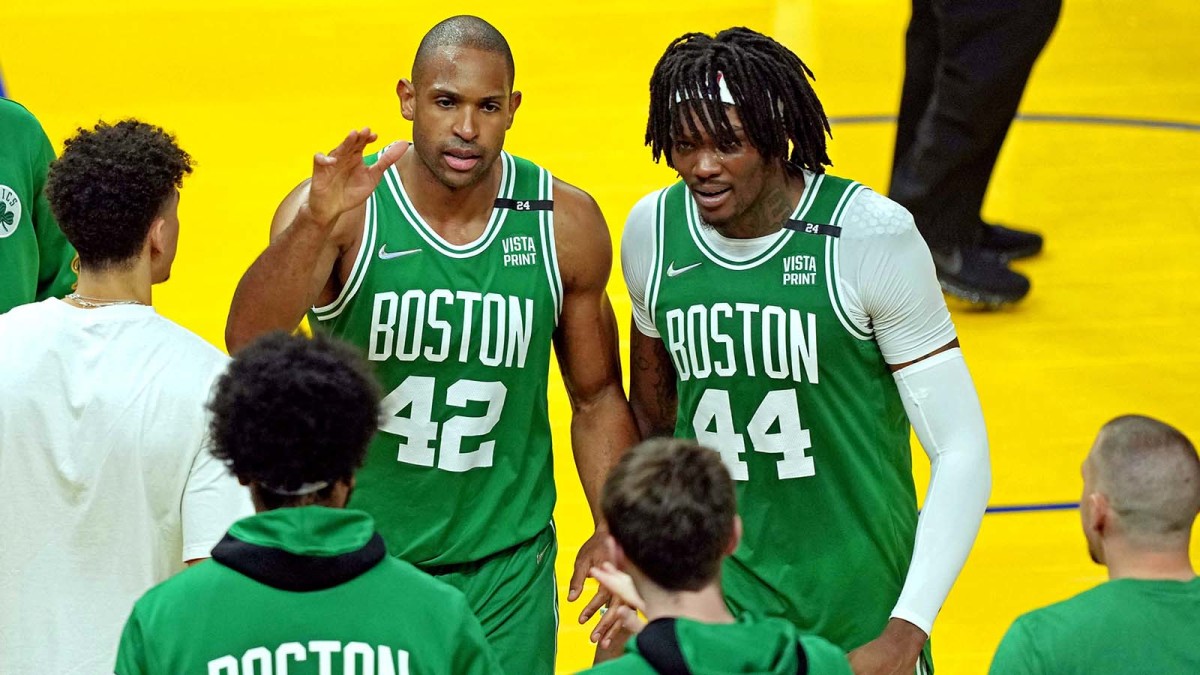How the Celtics Turned the Tables on the Warriors
SAN FRANCISCO—A 180, a flip, a reversal, whatever you want to call it, the Celtics turned the tables on the Warriors in the fourth quarter of Game 1 of the Finals. Boston outscored Golden State 40–16 in the final frame, restricting the Dubs to an offensive rating of 88.0. It was a defensive masterclass from the Celtics, who were the stingiest team during the regular season, and have since actually improved in the playoffs. What was the key to their fourth quarter shutdown on Thursday? It was what Boston has done best all year long—switching.
After starting the game with both Al Horford and Rob Williams—and curiously dropping on many pick and rolls—the Celtics played the entire fourth with only one big on the floor. Horford and Williams didn’t share the court, and the result was a smaller, quicker, switchier bunch.
“You know, they were attacking Rob at times with [Andrew] Wiggins,” Ime Udoka explained after the game. “He was a little bit too low. Al was as well. So we got a little bit more aggressive and took away some of their airspace on the threes, tried to get them inside the three-point line and make them beat us there, as well as going with the small lineup. Did some pre-switching to keep the bigs off, and it worked well for us.”

Boston struggled with two-big looks in Game 1. The starting five of Horford, Williams, Jayson Tatum, Jaylen Brown and Marcus Smart was outscored by eight points in only 14 minutes. Overall, the Celtics were a minus-10 with Horford and Williams together in 16 minutes, and a minus-4 in eight minutes with Horford and Grant Williams. Those pairings played a little bit more conservative defensively, dropping on Stephen Curry on the perimeter, which allowed him to step into some open threes.
As Udoka said, the switching allowed Boston to stay closer to shooters in the fourth quarter. Curry saw significantly fewer good looks, and as a team, Golden State shot only six threes before garbage time. The Warriors had launched 37 attempts from deep entering the quarter, or roughly 12.3 per period prior to the fourth. Pre-switching helped keep Rob Williams and Horford out of some actions with Curry, and the smaller lineup allowed the Celtics to swap matchups everywhere else on the floor.
Horford said after the game the scheme helped the Celtics on the glass as well. The Warriors had zero offensive rebounds in the fourth until garbage time after picking up 11 in the first three quarters. The second-chance points buoyed Golden State’s halfcourt offense, which was struggling for much of the game. By scrambling less on the perimeter, Boston was able to keep more bodies closer to the hoop in the fourth.
“Yeah, it’s been fun ever since I’ve been here, just all the defensive coverages we do, the way we can mix and match and make changes throughout the game,” Derrick White said postgame. “Just having everybody out there that can guard multiple positions, it’s a lot of fun. That’s what we hang our hat on.”
Also helping matters: Golden State’s lineups. The Warriors played much of the fourth with two non-shooters on the floor, cramping their spacing significantly. Draymond Green played five minutes alongside Andre Iguodala, and then another minute alongside Kevon Looney. (The three-guard lineup of Curry, Jordan Poole and Klay Thompson along with Wiggins and Green did make an appearance, but by then Boston’s run had turned into an avalanche, and that group does have issues defensively.)
Boston basically ignored Iguodala and Green on the perimeter whenever they were on the floor. Draymond prides himself on playing within his role offensively, but his lack of shooting could end up being a pressure point in this series. Looney at least offers elite rebounding when he’s the only big on the court. Green was left to his own devices offensively, and he responded with a 2-of-12 shooting night, including 0-of-4 from three.
So what does all of this mean for the rest of the series? It’s tempting to say the Warriors will need to ditch groups that have more than one non-shooter on the floor. That means eschewing Green-Iguodala and Green-Looney pairings, particularly when Boston goes small. That’s not to say the Dubs can have no success with such groups, only that the degree of difficulty will be much higher against a Celtics defense with no glaring weaknesses (which wasn’t the case in the last three rounds).
Watch the NBA Finals online with fuboTV: Try for free!
But shooting variance plays a role here—though to what degree is tricky to decipher. Defensively, the Warriors also struggled, giving up wide-open looks to Horford (and others) on the perimeter. Sure, some of the Celtics’ makes were fortunate. And Horford, White, Marcus Smart and Payton Pritchard likely wouldn’t connect on 17-of-26 (65.4%) from deep on the exact same shot diet in Game 2. But plenty of those looks were clean. Containing dribble penetration, forcing tougher shots, and getting out in transition will help the Warriors offensively as much as any lineup they play, and that in turn helps the defense. This game is also likely different if Green makes a couple of his open threes and White misses a couple of his tougher looks. (One more quirk: Pritchard played eight minutes in the fourth after playing six minutes total the previous two games. Maybe the Dubs attack him more next time?)
Ultimately, the Warriors can’t overreact to Game 1. But they can’t throw their hands up and point to hot shooting, either. The Celtics were quicker to putting spacier groups on the floor Thursday, and the beauty of their roster is how well their defense holds up no matter which combination of players is on the floor. The Warriors did not have the same luxury in Game 1. If Golden State aims to swing the series back in its favor, it needs to solve the Celtics’ switching.
More NBA Coverage:
